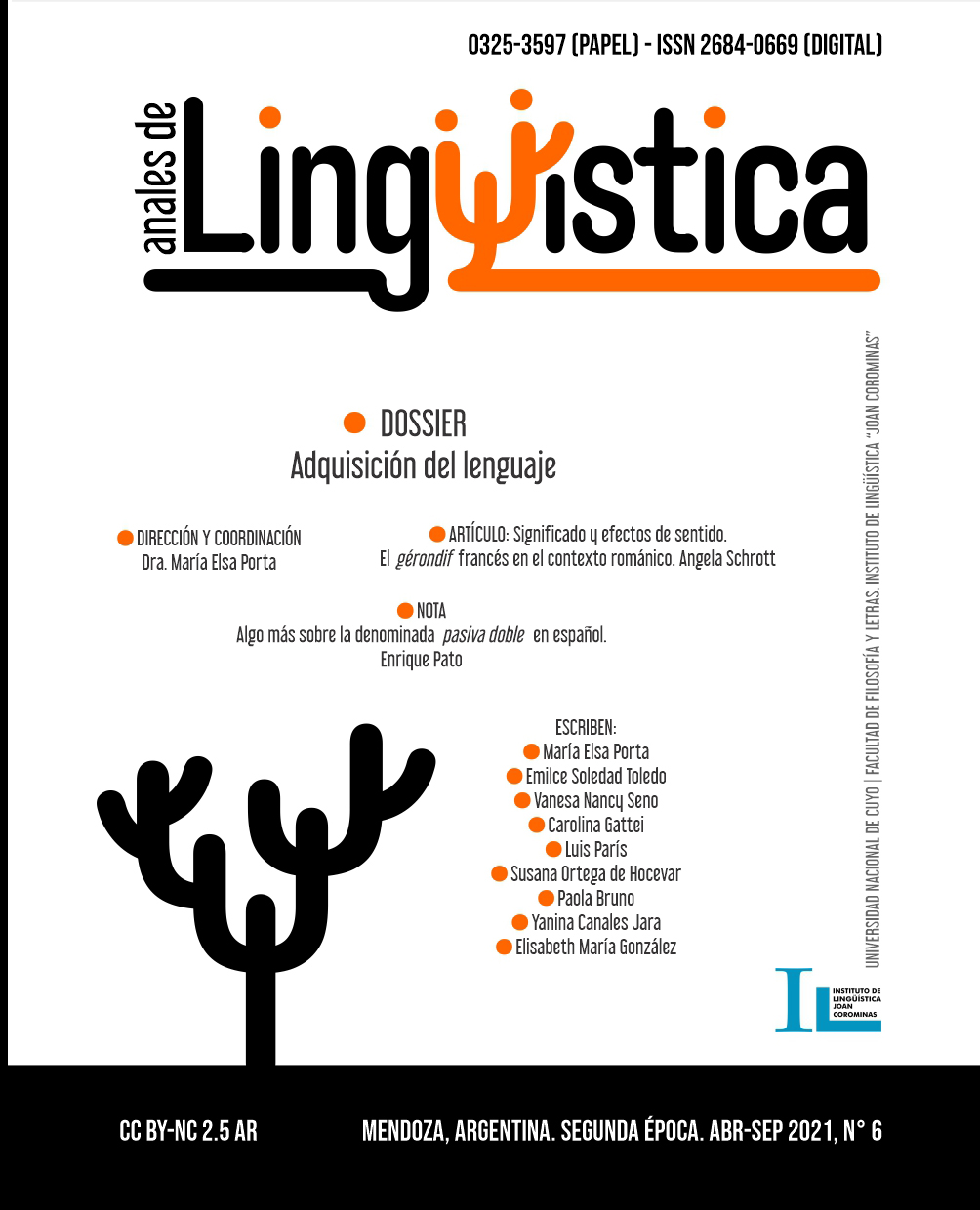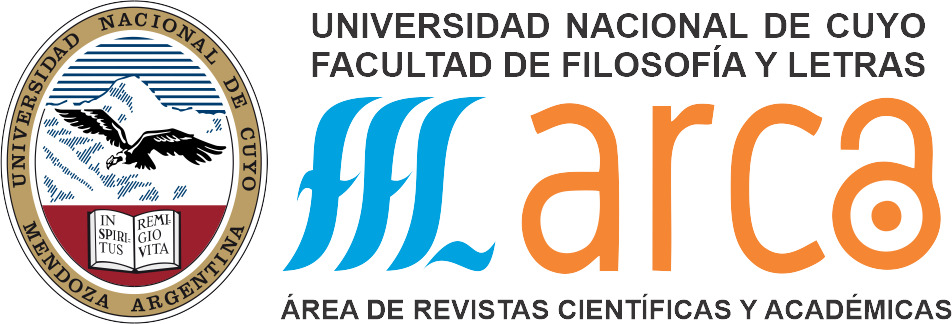Parental conceptions on family literacy
Keywords:
Implicit conceptions, Educational psychology, Early literacy, Family literacyAbstract
This article aims to analyze the interviews of the parents of the Initial level as part of the Master's thesis in reading and writing of the Faculty of Education (FED) of the National University of Cuyo (UNCuyo) "The Conceptions of Initial Level parents in the Literacy Process" (González 2019). This study has as reference the psychoeducational researches developed in Spain and Argentina about the implicit conceptions (Pozo, Schauer, Perez Echevería, Mateos, Martín & Cruz 2006) and deepens the study of social representations focused on the learning and teaching of written language. A problem that underlies all the research is the question of social inequality and its multiple links to schooling and teaching work. In this sense, and due to its relation with massive school failure, it has become one of the biggest concerns in the field of educational research in recent decades (Lus 2006). The family is the first educational nucleus because in its environment mediate a learning that is intimately linked to contextual, procedural and pragmatic aspects that favor the development of its members by referring to a natural group of people united by emotional and kinship ties who are together for a long time (Delucía 2014). The methodology of this work was descriptive and comparative and inquired about early literacy at home to mediate the importance of the role of the family in these first approaches that the child has with the written language. A series of workshops for parents, grandparents and caregivers were implemented, from 2014 to 2018, in institutions of the department of Guaymallén in the city of Mendoza. One of the results that stand out from this research is that it is demonstrated that one of the great challenges of working with the implicit concepts is to get to elaborate spaces to be able to visualize this framework of beliefs and discover the dynamics and processes of representational change. The analysis of the interviews, which are one of the instruments used in the research work, highlights the importance of the interactions that take place in the school environment between teachers and parents, in order to be able to make explicit, discuss, negotiate and even modify these representations which, due to their procedural and implicit nature, are difficult to recognize.
References
Báez de la Fe, B. S. (1993). Elementos definitorios del rol del psicólogo escolar. Revista de Psicología General y Aplicada, 46(6), 465-473.
Baquero R.; Cimolai S.; Pérez, A. y Toscano A. (2005). Las prácticas psicoeducativas y el problema de la educabilidad: la escuela como superficie de emergencia. IIPSI, 8(1), 121-137. doi 10.15381/rinvp.v8i1.4237
Baquero, R¸ Pérez, A. y Toscano, A. (2008). De las dificultades de predecir: educabilidad y fracaso escolar como categorías riesgosas Construyendo posibilidad. Apropiación y sentido de la experiencia escolar. Homo Sapiens. Buenos Aires: Federación de Educadores Bonaerenses.
Borzone, A. (2009). Leer y escribir a los 5. Buenos Aires: Aique.
Braslavsky, B. (2004). Primeras letras primeras lecturas. Buenos Aires: Fondo de Cultura Económica de Argentina.
Braslavsky, B (2005). Enseñar a entender lo que se lee. Buenos Aires: Fondo de Cultura Económica de Argentina.
Cassany, D. (2000). De lo analógico a lo digital. El futuro de la enseñanza de la composición. Lectura y vida 21(4), 6-15.
Coronado, M. (2012). Padres en fuga. Escuelas huérfanas. La conflictiva relación de las escuelas con las familias. Buenos Aires. Noveduc.
Cubero Pérez, R., Cubero Pérez, M., Santamaría Santigosa, A., Mata Benítez, M. de la, Ignacio Carmona, M. y Prados Gallardo, M. (2008). La educación a través de su discurso. Prácticas educativas y construcción discursiva del conocimiento en el aula. Revista de Educación, 346, 71-104.
Cury, A. (2012). Padres brillantes, maestros fascinantes. Barcelona: Planeta.
Darrault, I. (2000) Hacia una política de prevención en la escuela. Las dificultades y los trastornos del lenguaje oral y escrito. Documento inédito. Traducción M. V. Gómez de Erice. FEEyE.
De la Cruz, M. Scheuer, N., Baudino, V., Huarte, M. F., Sola, G., y Pozo, J. I. (2002). ¿Cómo aprenden a escribir los niños? Las concepciones de padres y maestros de comunidades educativas en entornos socioculturales medios y marginados. Estudios pedagógicos (28), 7-29. doi 10.4067/S0718-07052002000100001
Dehaene, S. (2019). ¿Cómo aprendemos? España: Siglo Veintiuno.
Delucía, K. A. (2014). Dinámica familiar y rendimiento escolar. Buenos Aires: Biblos.
Ferreiro, E. (2008). La lectura y la escritura en la educación inicial. En: Conferencia organizada por la Dirección General de Cultura y Educación. Recuperado de https://www.youtube.com/watch?v=zh6lVMB66SI
González, E. (2019). Las concepciones de los padres de Nivel Inicial en el Proceso alfabetizador. Tesis de Maestría en Lectura y Escritura. Facultad de Educación, Universidad Nacional de Cuyo. Inédito.
Karmiloff, K. & Karmiloff-Smith, A. (2005). Hacia el lenguaje: del feto al adolescente. Madrid: Morata.
Lus, M. A. (2006). Si no mejoramos busquemos el por qué. Ministerio de Educación, Ciencia y Tecnología de la Nación.
Martínez Domínguez, B. (2011). Luces y sombras de las medidas de atención a la diversidad en el camino de la inclusión educativa. (U. d. Zaragoza, Ed.) Revista Interuniversitaria de Formación del Profesorado, 25(1), 165-183.
Nelson, K. (1996). Language in cognitive development. The emergence of the mediated mind. New York: Cambridge University Press.
Neuman, S. & Roskos, K. (1998). Chilfren's Achieving. Best Practices in Early Literacy. Newwark, DE: Internacional Reading Associations.
Ortega de Hocevar, S. (2005). De la alfabetización temprana a la convencional. Articulación entre nivel inicial y primer ciclo de la EGB para evitar el fracaso escolar. En: Fresquet, A. y Porcar, M. (Eds.). Nivel Inicial. Reflexiones. Críticas y propuestas. Serie Construir, Deconstruir y Reconstruir. (Vol. III, pp. 63-75). Mendoza: EFE.
Ortega de Hocevar, S (2014). Didáctica de la lectura y la escritura. Una propuesta de alfabetización inicial. Mendoza: EFE.
Ortega y Gasset, J. (1940). Ideas y creencias. Madrid: Alianza.
Pinker, S. (2006). El misterio de las palabras. Una introducción a la naturaleza humana. Madrid: Taurus.
Pozo, J. I. Scheuer, N., Pérez Echevería M., Mateos, M., Martín, E., Cruz, M. (2006). Nuevas formas de pensar la enseñanza y el aprendizaje. Barcelona: Graó.
Purcell-Gates, V. (1996). Stories, Coupons and the TV Guide. Relationships between Home and Emergent Literacy Knowledge. Reading Research Quarterly, 31(4), 406-428.
Rogoff, B. (1993). Aprendices del pensamiento. El desarrollo cognitivo en el contexto social. Barcelona: Paidós.
Scheuer, N., De la Cruz, M. y Pozo, J. I. (2010). Aprender a dibujar y escribir. La perspectiva de los niños, sus familias y maestros. Buenos Aires: Noveduc.
Solé, I. (1992). Estrategias de lectura. Barcelona: Ice-Grao.
Sulzby, E. & Barnhart, J. (1992). La evolución de la competencia académica: todos nuestros niños emergen como lectores y escritores. En: J. Irwin y A. Doyle (Comp.), Conexiones entre lectura y escritura (pp. 150-177). Buenos Aires: Aique.
Tomasello, M. (2007). Los orígenes culturales de la cognición humana. Madrid: Amorrortu.
Vigotsky, L. S. (1964). Pensamiento y lenguaje. Buenos Aires: Lautaro.
Vigotsky, L. S. (1979). El desarrollo de las funciones psicológicos superiores. Barcelona: Crítica.
Wasik, B. H., & Herrmann, S. (2004). Family literacy: History, concepts, services. Handbook of family literacy. Mahwah: Lawrence Earlbaum Associates Publishers.
Downloads
Published
How to Cite
Issue
Section
License
Copyright (c) 2021 Anales de Lingüística
Esta obra está bajo una Licencia Creative Commons Atribución 2.5 Argentina.
Los/as autores/as que publican en esta revista están de acuerdo con los siguientes términos:
1. Los/as autores conservan los derechos de autor y garantizan a la revista el derecho de ser la primera publicación del trabajo bajo una licecncia Creative Commons Atribución 2.5 Argentina (CC BY 2.5 AR) . Por esto pueden compartir el trabajo con la referencia explícita de la publicación original en esta revista.
2. Anales de lingüística permite y anima a los autores a difundir la publicación realizada electrónicamente, a través de su enlace y/o de la versión postprint del archivo descargado de forma independiente.
3. Usted es libre de:
Compartir — copiar y redistribuir el material en cualquier medio o formato
Adaptar — remezclar, transformar y construir a partir del material para cualquier propósito, incluso comercialmente.












